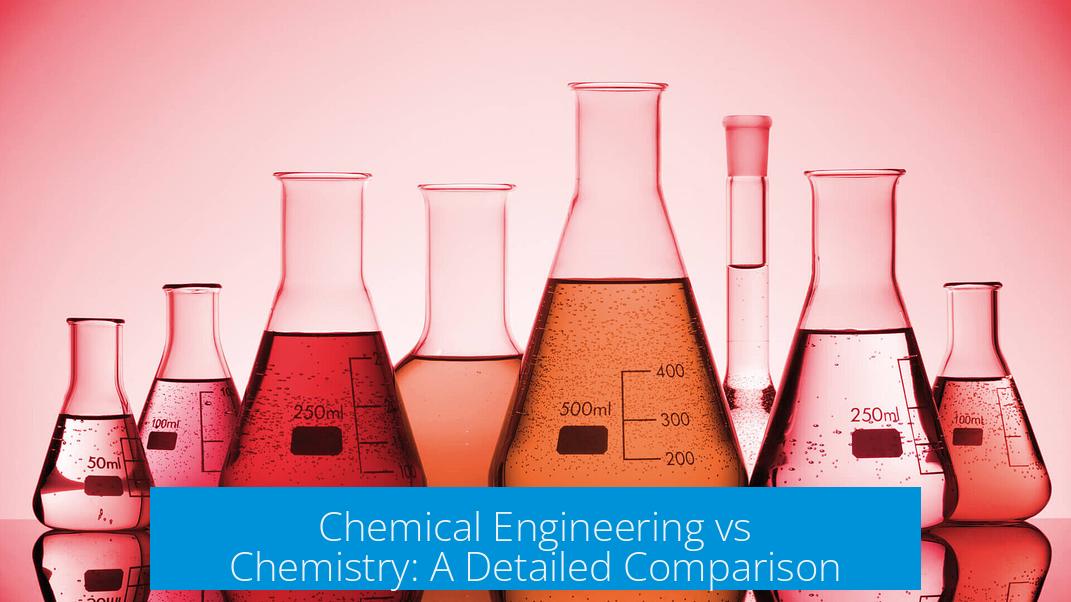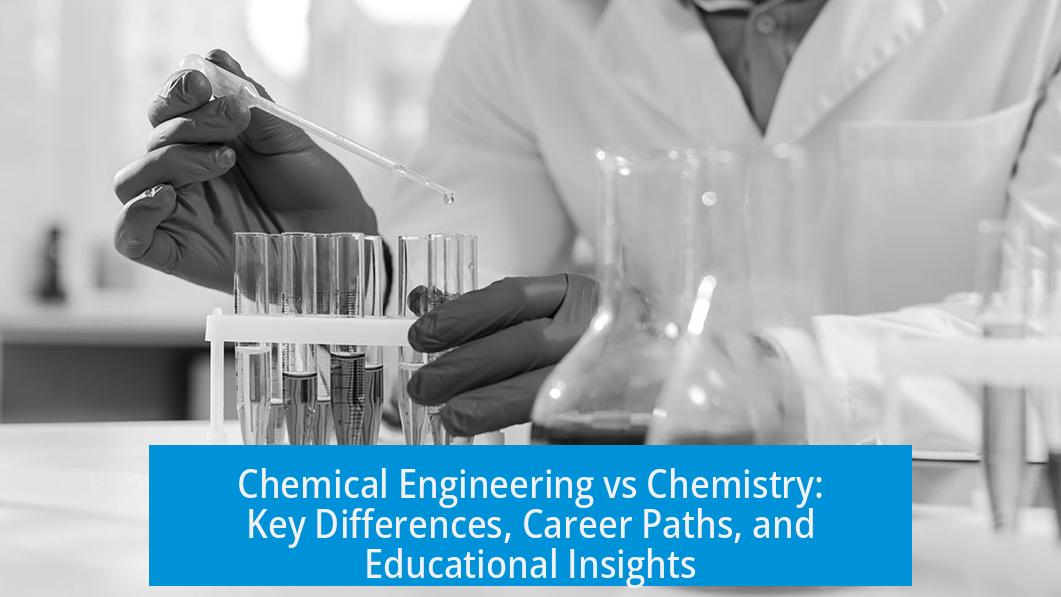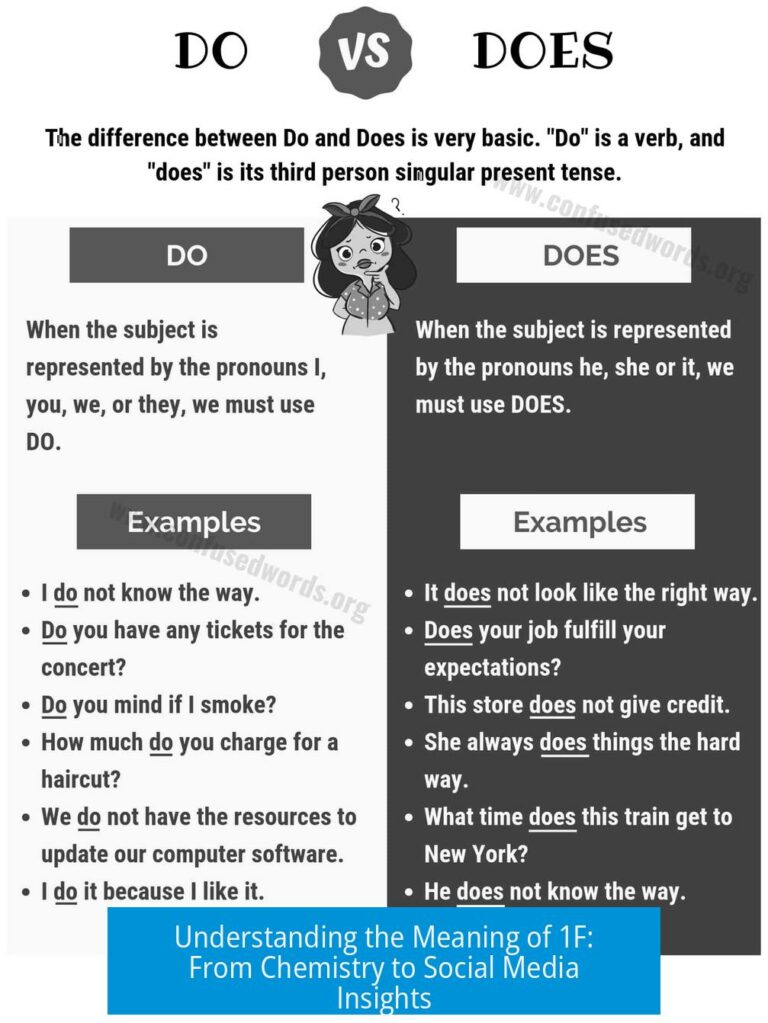Chemical Engineering vs Chemistry: A Detailed Comparison

Chemical engineering and chemistry are distinct but related fields. Chemical engineering focuses on the application of chemistry and engineering principles to design and optimize chemical processes. Chemistry centers on understanding matter at a molecular and atomic level. Both fields offer different career paths, skill sets, and educational experiences. This article breaks down their differences and similarities in a clear, factual manner to help readers understand their unique aspects.
1. Focus and Career Orientation
Chemical engineering merges chemistry with engineering. It emphasizes designing and improving chemical manufacturing and industrial processes.
- Chemical engineers optimize large-scale chemical production processes, ensuring efficiency, safety, and sustainability.
- Chemistry involves studying chemical reactions, structures, and properties primarily on a molecular or lab scale.
For example, in the famous Haber-Bosch process, Fritz Haber, a chemist, discovered the chemical reaction converting nitrogen gas to ammonia at the lab scale. Carl Bosch, a chemical engineer, then scaled the process for industrial production.
This distinction illustrates how chemists develop molecular knowledge and reaction mechanisms, while chemical engineers focus on applying that knowledge for practical production.
2. Educational Curriculum Differences
The curriculum for each discipline reflects their focus areas and career applications.
| Aspect | Chemical Engineering | Chemistry |
|---|---|---|
| Core Subjects | Process design, transport phenomena (fluid dynamics, heat, and mass transfer), thermodynamics (bulk properties), reactor design, process control. | Organic, inorganic, physical chemistry; quantum mechanics; statistical thermodynamics (molecular approach); analytical methods. |
| Math and Science | Calculus, differential equations, linear algebra, physics (technical, applied to engineering problems), and chemistry basics. | Advanced chemistry courses, calculus, linear algebra, physics (focused on fundamental concepts), biology (optional in some programs). |
| Laboratory Focus | Instrumentation related to process control, reactor operation, scaled-up experiments. | Lab work on synthesis, characterization, analysis, reaction mechanisms at small scale. |
| Curricular Shifts Over Time | Moved away from fundamental synthesis toward reactor scale-up, instrumentation for industrial use. | Reduced fluid dynamics, emphasized molecular level understanding through quantum mechanics and thermodynamics. |
Though both degrees demand strong foundations in math, physics, and chemistry, chemical engineering leans more toward applied math and engineering sciences. Chemistry studies delve deeper into molecular theory and experimental techniques.
3. Flexibility and Switching Paths
Changing majors between chemical engineering and chemistry typically happens early in college, usually in the first or second year, without significant delay.
- Introductory courses share overlapping material, aiding smooth transitions.
- Students often switch based on shifts in interest or perceived career opportunities.
- Major switching is common and viable, as foundational courses are similar initially.
One individual reflects on choosing chemical engineering to reduce career uncertainty, while advising others to select the major aligning best with their passion, as both are rigorous disciplines.
4. Career Prospects and Industry Applications
Chemical engineering graduates often enjoy broader and more abundant job opportunities immediately after earning a bachelor’s degree. Engineering jobs generally offer competitive starting salaries.
Key areas for chemical engineers include:
- Process engineering in energy, chemicals, and pharmaceuticals.
- Designing and scaling production equipment.
- Process optimization for cost and sustainability.
Chemistry graduates often pursue advanced degrees for specialized roles, particularly in research and development fields.
Examples of traditional chemistry career paths include:
- Organic synthesis chemists developing new molecules.
- Protein chemists specializing in biochemistry.
- Analytical chemists involved in quality control and testing.
- Pharmaceutical chemists working in drug discovery and design.
These positions tend to be more competitive and less numerous but may offer rewarding research experiences and innovation leadership.
5. Graduate School and Further Study
Chemistry majors often require graduate studies to access many high-level or research-focused jobs. In contrast, chemical engineering graduates find well-paid industry roles with only a bachelor’s degree.
However, chemical engineering undergraduates can pursue chemistry graduate programs if desired without major barriers.
6. Personal Considerations in Choosing a Field
Choosing between chemistry and chemical engineering depends on personal interests and career goals.
- Students interested in theoretical understanding and research may favor chemistry.
- Those drawn to practical problem-solving in industrial contexts may prefer chemical engineering.
- Financial goals and immediate job prospects might influence students toward chemical engineering.
Ultimately, the best choice balances passion, skills, and practical considerations.
7. International Perspective: Program Examples
Programs vary by country and university. For instance, the University of Granada in Spain offers a respected chemistry program.
This program illustrates the importance of language and cultural factors. Classes are taught in Spanish, requiring a strong language level for international students, though textbooks are in English.
Such details affect program accessibility and student experience but do not alter fundamental distinctions between the disciplines.
Summary of Key Points
- Chemical engineering focuses on applying chemistry and engineering to industrial processes, emphasizing scale-up and process optimization.
- Chemistry concentrates on molecular-level understanding, theory, and laboratory research.
- Curricula differ; chemical engineering targets reactor design and process control, chemistry focuses on synthesis and molecular theory.
- Switching between majors is commonly feasible early in studies.
- Chemical engineering offers broad job prospects and well-paid roles post-bachelor’s degree.
- Chemistry careers often require graduate education and lead to specialized research roles.
- Personal interests and career goals should guide the choice of degree.
- International programs have language and cultural considerations but maintain core field distinctions.
What is the main difference between chemical engineering and chemistry?
Chemical engineering focuses on designing and optimizing chemical processes on an industrial scale. Chemistry studies the molecular and lab-based aspects of substances and reactions. Engineers scale up what chemists discover.
Can I switch between chemical engineering and chemistry majors easily?
Yes, switching between the two is common in the first or second year. The coursework overlaps enough that catching up is manageable. Many students switch based on interest or career goals.
Which degree offers better job prospects and salaries without graduate school?
Chemical engineering generally offers better job prospects and higher salaries with just a bachelor’s degree. Chemistry jobs in specialized fields like pharma R&D pay well but are more competitive and often require graduate studies.
How do the curricula of chemical engineering and chemistry differ?
Chemical engineering emphasizes scaled reactors, process control, and industrial applications. Chemistry focuses on quantum mechanics, molecular theory, and synthesis. Both require strong math, physics, and foundational chemistry courses.
Is graduate school necessary for a chemistry career?
Graduate school is often recommended for chemistry careers, especially in research and development. Chemical engineers can enter many roles with a bachelor’s degree but may also pursue advanced studies for specialized fields.





Leave a Comment